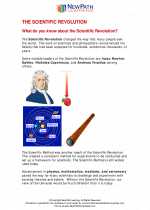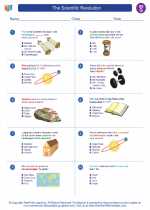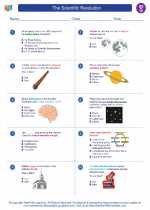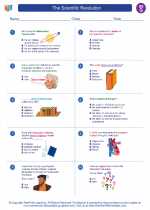The Scientific Revolution
The Scientific Revolution changed the way that many people saw the world. The work of scientists and philosophers revolutionized the beliefs that had been accepted for hundreds, sometimes thousands, of years. Some notable leaders of the Scientific Revolution are Isaac Newton, Galileo, Nicholas Copernicus, and Andreas Vesalius among others. Read More...
◂Social Studies Worksheets and Study Guides Seventh Grade. The Scientific Revolution
Study Guide The Scientific Revolution
The Scientific Revolution  Worksheet/Answer key
Worksheet/Answer key The Scientific Revolution
The Scientific Revolution  Worksheet/Answer key
Worksheet/Answer key The Scientific Revolution
The Scientific Revolution  Worksheet/Answer key
Worksheet/Answer key The Scientific Revolution
The Scientific Revolution 

 Worksheet/Answer key
Worksheet/Answer key
 Worksheet/Answer key
Worksheet/Answer key
 Worksheet/Answer key
Worksheet/Answer key

The resources above cover the following skills:
National Curriculum Standards for Social Studies (NCSS)
TIME, CONTINUITY, AND CHANGE
SOCIAL STUDIES PROGRAMS SHOULD INCLUDE EXPERIENCES THAT PROVIDE FOR THE STUDY OF THE PAST AND ITS LEGACY.
KNOWLEDGE - Learners will understand:
The study of the past provides a representation of the history of communities, nations, and the world.
That learning about the past requires the interpretation of sources, and that using varied sources provides the potential for a more balanced interpretive record of the past.
That historical interpretations of the same event may differ on the basis of such factors as conflicting evidence from varied sources, national or cultural perspectives, and the point of view of the researcher.
Key historical periods and patterns of change within and across cultures (e.g., the rise and fall of ancient civilizations, the development of technology, the rise of modern nation-states, and the establishment and breakdown of colonial systems).
The contributions of key persons, groups, and events from the past and their influence on the present.
The influences of social, geographic, economic, and cultural factors an the history of local areas, states, nations, and the world.
SCIENCE, TECHNOLOGY, AND SOCIETY
SOCIAL STUDIES PROGRAMS SHOULD INCLUDE EXPERIENCES THAT PROVIDE FOR THE STUDY OF RELATIONSHIPS AMONG SCIENCE, TECHNOLOGY, AND SOCIETY.
KNOWLEDGE - Learners will understand:
Values, beliefs, and attitudes that have been influenced by new scientific and technological knowledge (e.g., invention of the printing press, conceptions of the universe, applications of atomic energy, and genetic discoveries).
National Center for History in Schools (NCHS)
Historical Thinking Standards
Chronological Thinking
Identify the temporal structure of a historical narrative or story.
Reconstruct patterns of historical succession and duration; explain historical continuity and change.
Historical Comprehension
Reconstruct the literal meaning of a historical passage.
Identify the central question(s) the historical narrative addresses.
Historical Analysis and Interpretation
Draw comparisons across eras and regions in order to define enduring issues.
Challenge arguments of historical inevitability.
Hold interpretations of history as tentative.
Historical Research Capabilities
Formulate historical questions.
Historical Issues-Analysis and Decision-Making
Identify issues and problems in the past.
Identify relevant historical antecedents.
World History Content Standards
Era 6: The Emergence of the First Global Age, 1450-1770
How European society experienced political, economic, and cultural transformations in an age of global intercommunication, 1450-1750.
The student understands how the Scientific Revolution contributed to transformations in European society.
Major global trends from 1450-1770.
The student understands major global trends from 1450 to 1770.